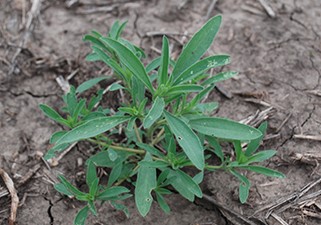
- Resistant kochia can be exceptionally competitive with corn, soybean and cereal crops
- Wind often breaks kochia stems, which allows the weed to tumble across long distances and spread seeds
- Using diverse management practices when applying residual herbicides is imperative to treating resistant kochia
As resistant kochia continues to spread across the U.S., Syngenta provides key strategies to best manage the highly adaptable, genetically diverse weed.
There are a number of key characteristics of kochia that make it especially difficult to control. According to the United Soybean Board, kochia is tolerant to hot, dry conditions and soils with high salinity. It can produce up to 30,000 seeds per plant, its root system can extend down 15 feet and measure 21 feet in diameter, and the weed itself can grow up to 6 feet high. In addition, herbicide-resistant kochia is rapidly evolving due to short seed life, high genetic diversity and heavy reliance on herbicides for control in minimum- and no-till cropping systems.
“Kochia is highly adaptable and can be found in every state except for Alaska and Florida. It can either self-pollinate or can outcross, which increases genetic diversity,” said Joe Wuerffel, Ph.D., research and development scientist at Syngenta. “It is essentially a tumbleweed, which means at the end of the season, kochia will harden and die off at its base. When you have a lot of wind and flat ground, kochia can break and really get moving, spreading seeds and resistance.”
Because of these key challenges, many growers have significant difficulty managing resistant kochia. Many growers have learned that managing kochia is not a one-step process. Wuerffel said Syngenta has some great options to help control kochia in soybeans, corn and cereal crops.
“For excellent residual control in soybeans, BroadAxe® XC herbicide is the best option as it provides a combination of sulfentrazone and Dual Magnum® herbicide,” said Wuerffel. “For corn growers, Syngenta offers both Acuron® and Acuron Flexi pre-emergence herbicides, each containing bicyclopyrone, which is designed to
complement the other active ingredients in the premix to deliver broader, more consistent control of tough weeds other products are missing. And lastly, Syngenta recommends a post-emergence application of Talinor™ herbicide for cereals, as kochia has not shown resistance to either of its two effective modes of action.”
Growers have found value in Syngenta herbicide solutions that help manage resistant kochia.
Click here to see more...